Maximum
Swine
Marketing Ltd. Newsletter
Hog Commentary for
March 20th, 2006
Hog
Markets
Cash prices were lower this week but regional bids were relatively
steady for most of the week. Regional cash prices declined over
a dollar US on Tuesday and were steady from that point forward.
National cash prices experienced a slight decline for each day
in the reporting period. Similar to the national cash prices,
cutout also declined in each of the days in the reporting period.
All cuts experienced some weakness which indicates that the
weakness is a domestic issue. The high slaughter levels of the
past 2 weeks coupled with an abundance of poultry and beef on
the market will cause some short-term weakness in product movement.
Medium term projections are for improving meat values as hog
slaughter is projected to fall into April.
Lean hog futures continue to struggle as traders seem reluctant
to put any value into the market due to the conditions outlined
above. The nearby April was one of the stronger contracts traded
last week, down slightly at $59.00 US/cwt. Lower trading was
noticed in the summer contracts with the May, Jun, and Jul contracts
down $1.52, $1.79, $2.29 US/cwt respectively. The board will
continue to trade short term data and be reluctant to put value
into the market until meat values rally into the spring and
poultry stocks begin to reside with a drop in production.
Feed Markets
Progressing South American soybean harvest estimated at 30%
complete is providing weakness to the US soy complex along with
large domestic stocks and talk of decreasing demand due to falling
poultry production. The Brazilian Ag Ministry has pegged this
year’s crop at a record 57.2 million mt and with limited
storage facilities in the country plenty of cash grain is likely
to hit the world market in the weeks ahead. Heavy snow fall
and rains across the Midwest has improved soil conditions for
the upcoming crop year adding to the recent sell off in beans
and meal prices. Although plenty of market information points
to lower prices into 2006, funds appear willing to buy this
market at current market levels limiting the downside to only
a few more dollars. Hog producers need to control input costs
this year and locking in 10 year lows for soymeal is one way
to keep production cost down.
Nearby corn futures dropped 10 cents per bushel over the past
week as analysts report improved soil conditions for planting
across the Midwest. Early estimates are for reduced corn acres
this year however as conditions improve and input costs including
fertilizer take a breather growers may choose to plant more
corn the initially thought. Fundamentally the market remains
strong with exports well above the pace set out by the USDA
and ethanol production steadily increasing. Recent weakness
in energy markets is providing some of the pressure seen in
prices and is a good opportunity for end users to cover some
of the needs for 2006. A spring rally is likely once some of
the crop is in the ground, between now and then hog producers
should look for opportunity to secure a portion of feed grain
requirements.

